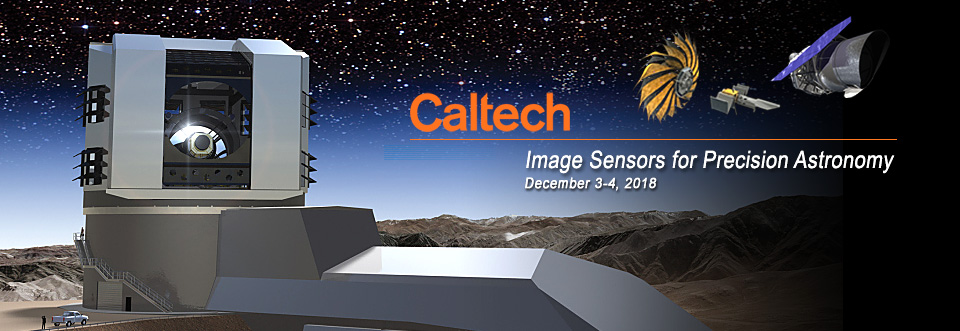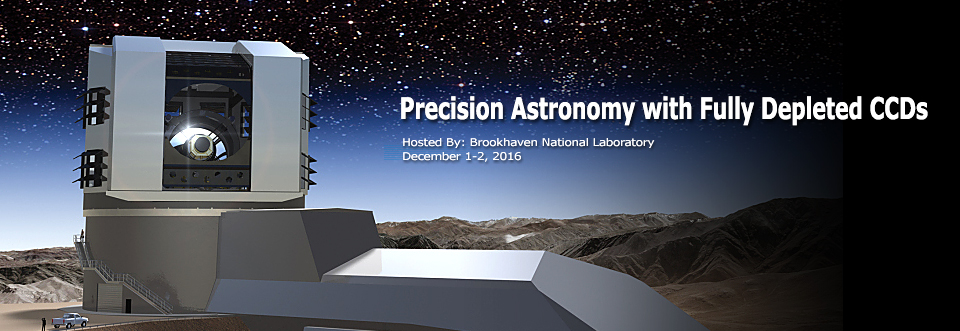

March 12–14, 2024
ISPA 2018

Workshop on Image Sensors for Precision Astronomy
Dates: December 3–4, 2018
This workshop will be held as an in-person event.
Motivation
The 4th workshop on Image Sensors for Precision Astronomy (ISPA) convenes astronomers and detector experts to address the challenges of making state-of-the-art measurements with imperfect detectors. Attendees will assess the impact of detector systematics on science goals and discuss strategies for characterization, calibration, and mitigation.
The scope of ISPA includes detector issues in any sensor type which affect applications such as photometry, astrometry, spectroscopy, coronagraphy, and shape measurement. ISPA was previously called PACCD - Precision Astronomy with fully depleted CCDs.
Travel Assistance for Students/Postdocs

Travel Assistance for Students and Postdocs is made possible by a sponsorship from Semiconductor Technology Associates, Inc. We are not accepting additional travel requests at this time.
Maximizing Interactions
Both oral talks and posters are invited, please contact the organizers if you would like to present at the workshop. The program will be spread over two full days, with ample breaks to promote interactions. Coffee and snacks will be served in the poster display area before sessions and between sessions. Refreshments will be served afterwards. Lunches will be provided to further promote interaction time. Fees are only being collected to cover these catering costs.
Since conference dinners tend to offer half the quality for twice the price, we will instead coordinate reservations at one or several of the excellent local restaurants for anyone interested. We hope that participants will join us on both evenings for more stimulating discussions over dinner.
Payment for Registration
General registration is $100 US and is being collected online by Caltech to cover catering costs. Use the "Pay Now" button below to pay your registration if you have already registered, have your registration ID number, and have not paid your registration fee. If necessary, you will find your registration ID number in your confirmation email.
Please note, you must register first to get the required registration ID number.
Related Information
The scope of ISPA includes detector issues in any sensor type which affect applications such as photometry, astrometry, spectroscopy, coronagraphy, and shape measurement.
ISPA was previously called PACCD (Precision Astronomy with fully depleted CCDs).
Scientific Organizing Committee
- Andrei Nomerotski (BNL, Chair)
- Pierre Astier (LPNHE)
- Chris Bebek (LBNL)
- Gary Bernstein (Penn)
- Juan Estrada (Fermilab)
- Mike Jarvis (Penn)
- Robert Lupton (Princeton)
- Eugene Magnier (Hawaii)
- Satoshi Miyazaki (NAOJ)
- Paul O'Connor (BNL)
- John Peterson (Purdue)
- Andrew Rasmussen (SLAC)
- Ian Shipsey (Oxford University)
- Vyshi Suntharalingam (MIT Lincoln Labs)
Local Organizing Committee
- Erika Hamden (U. of Arizona)
- Shouleh Nikzad (JPL, journal editor)
- Chaz Shapiro (JPL)
- Roger Smith (Caltech)
Co-Organizers
Workshop Location & Directions
California Institute of Technology
1216 E. California Boulevard
Pasadena, CA 91125 USA
Participants will meet at the Cahill Center for Astronomy & Astrophysics (Hameetman Auditorium), popular location for large, general meetings in Cahill. It seats approximately 150, and is located on the first floor East side of Cahill
Workshop Accommodations
When booking your reservation, you may need to guarantee your room with a credit card. Check with your hotel about their cancellation policy and if they offer shuttle service.
Event ID: ISPA2018
Workshop website hosted and maintained by Brookhaven National Laboratory (BNL).
Rendering of the LSST Courtesy: LSST Corporation

PACCD 2016

Workshop on Precision Astronomy with Fully Depleted CCDs
Dates: December 1–2, 2016
This workshop will be held as an in-person event.
Motivation
The Workshop on Precision Astronomy with Fully Depleted CCDs will focus on topics of making precision astronomical measurements of flux (photometry), position (astrometry) and shapes (weak lensing) with thick, deep-depleted CCD detectors. Impact of sensor related effects on the Dark Energy science will be addressed through presentations and discussions
Scientific Organizing Committee
- Pierre Astier (LPNHE)
- Chris Bebek (LBNL)
- Gary Bernstein (Penn)
- Juan Estrada (Fermilab)
- Mike Jarvis (Penn)
- Robert Lupton (Princeton)
- Eugene Magnier (Hawaii)
- Satoshi Miyazaki (NAOJ)
- Andrei Nomerotski (BNL, Chair)
- Paul O'Connor (BNL)
- John Peterson (Purdue)
- Andrew Rasmussen (SLAC)
- Ian Shipsey (Oxford University)
- Roger Smith (Caltech)
- Chris Stubbs (Harvard)
Local Organizing Committee
- Erika Hamden (U. of Arizona)
- Shouleh Nikzad (JPL, journal editor)
- Chaz Shapiro (JPL)
- Roger Smith (Caltech)
Co-Organizers
Proceedings
The workshop proceedings have been published in the Journal of Instrumentation.
Special Evening Event
Registered attendees are invited to attend the no-host banquet dinner in a restaurant following the first day of the meeting.
Location, time and cost to be determined. Payment will be cash and will be collected during the workshop.
Workshop Venue
Brookhaven National Laboratory
Upton, NY 11973 USA
Workshop Location
Physics Department (Bldg. 510)
Large Seminar Room
Related Information
- LSST: Providing an Unprecedented View of the Cosmos
- Get the latest updates and learn more at LSST.org
- University of Arizona Imaging Technology Laboratory (ITL)
- Semiconductor Technology Associates, In
Special Thanks
We gratefully acknowledge financial support from the following organizations:
Event ID: PACCD2016
Workshop website hosted and maintained by Brookhaven National Laboratory (BNL).
Rendering of the LSST Courtesy: LSST Corporation
PACCD 2014

Workshop on Precision Astronomy with Fully Depleted CCDs
Dates: December 4–5, 2014
This workshop will be held as an in-person event.
Motivation
The Workshop on Precision Astronomy with Fully Depleted CCDs will focus on topics of making precision astronomical measurements of flux (photometry), position (astrometry) and shapes (weak lensing) with thick, deep-depleted CCD detectors. Impact of sensor related effects on the Dark Energy science will be addressed through presentations and discussions
Scientific Organizing Committee
- Pierre Astier (LPNHE)
- Chris Bebek (LBNL)
- Gary Bernstein (Penn)
- Juan Estrada (Fermilab)
- Mike Jarvis (Penn)
- Robert Lupton (Princeton)
- Eugene Magnier (Hawaii)
- Satoshi Miyazaki (NAOJ)
- Andrei Nomerotski (BNL, Chair)
- Paul O'Connor (BNL)
- John Peterson (Purdue)
- Andrew Rasmussen (SLAC)
- Roger Smith (Caltech)
- Chris Stubbs (Harvard)
Local Organizing Committee
- Erika Hamden (U. of Arizona)
- Shouleh Nikzad (JPL, journal editor)
- Chaz Shapiro (JPL)
- Roger Smith (Caltech)
Special Evening Event
Registered attendees are invited to attend the no-host banquet dinner in a restaurant following the first day of the meeting.
Location, time and cost to be determined. Payment will be cash and will be collected during the workshop.
Workshop Venue
Brookhaven National Laboratory
Upton, NY 11973 USA
Workshop Location
Physics Department (Bldg. 510)
Large Seminar Room
Related Information
- LSST: Providing an Unprecedented View of the Cosmos
- Get the latest updates and learn more at LSST.org
Proceedings
The workshop proceedings have been published in the Journal of Instrumentation.
Submission instructions for authors:
Accepted papers will be published after the workshop, following a peer review in the proceedings section of the Journal of Instrumentation (JINST), which is managed by Institute of Physics and SISSA.
The deadline for paper submission is January 15, 2015. Page allocations are 10 pages for a talk and 8 pages for a poster.
To prepare your contribution for submission, please use the JINST Proceedings templates at http://jinst.sissa.it/jinst/help/JINST_TeXclass.jsp
When writing your contribution, in addition to the scientific quality and relevance of the subject matter, it's advisable to also check the quality of formatting, language and style (i.e. incoherent use of unit of measure; different conventions used in the same paper such as abbreviations \3 s", \3 sec", \3 seconds" and position: \3C", \3 C"; poorly organized tables; etc.).
When your contribution is ready for submission, please follow the instructions below:
- Connect to http://jinst.sissa.it and register by going to the [Access] section as shown in the screenshot below.

- In the [Submit] section of the page. click on the [submit a proceedings contribution] link as shown in the screenshot below.

- Find the [Precision Astronomy with Fully Depleted CCDs - PACCD2014] Workshop section from the list as shown in the screenshot below and choose [submit a paper] or [submit a technical report].

- Follow the step-by-step procedure for submission, referring to the instructions available in the section [For Authors] at the top of the JINST home page at: http://jinst.sissa.it/jinst/help/helpLoader.jsp?pgType=author
Kindly make sure you submit your contribution by January 15, 2015. Please contact me and the JINST Editorial Office at jinst-eo@jinst.sissa.it for any additional information or assistance.
Andrei Nomerotski
PACCD 2014 Proceedings Editor
anomerotski@bnl.gov
Event ID: PACCD2014
Workshop website hosted and maintained by Brookhaven National Laboratory (BNL).
Rendering of the LSST Courtesy: LSST Corporation
PACCD 2013

Workshop on Precision Astronomy with Fully Depleted CCDs
Dates: December 4–5, 2013
This workshop will be held as an in-person event.
Motivation
The Workshop on Precision Astronomy with Fully Depleted CCDs will focus on topics of making precision astronomical measurements of flux (photometry), position (astrometry) and shapes (weak lensing) with thick, deep-depleted CCD detectors. Impact of sensor related effects on the Dark Energy science will be addressed through presentations and discussions
Scientific Organizing Committee
- Pierre Antilogus (LPNHE, Paris)
- Chris Bebek (LBNL)
- David Burke (SLAC)
- Juan Estrada (Fermilab)
- Robert Lupton (Princeton)
- Andrei Nomerotski (BNL, Chair)
- Paul O'Connor (BNL)
- Roger Smith (Caltech)
- Chris Stubbs (Harvard)
- John Tonry (Hawaii)
- Dorothy Davis (BNL, Admin Assist.)
Related Information
- LSST: Providing an Unprecedented View of the Cosmos
- Get the latest updates and learn more at LSST.org
Special Evening Event
Registered attendees are invited to attend the no-host banquet dinner in a restaurant following the first day of the meeting.
Location, time and cost to be determined. Payment will be cash and will be collected during the workshop.
Workshop Venue
Brookhaven National Laboratory
Upton, NY 11973 USA
Workshop Location
Physics Department (Bldg. 510)
Large Seminar Room
Proceedings
The workshop proceedings have been published in the Journal of Instrumentation.
Submission instructions for authors:
Accepted papers will be published after the workshop, following a peer review in the proceedings section of the Journal of Instrumentation (JINST), which is managed by Institute of Physics and SISSA.
The deadline for paper submission is December 18, 2013. Page allocations are 10 pages for a talk and 8 pages for a poster.
To prepare your contribution for submission, please use the JINST Proceedings templates at http://jinst.sissa.it/jinst/help/JINST_TeXclass.jsp
When writing your contribution, in addition to the scientific quality and relevance of the subject matter, it's advisable to also check the quality of formatting, language and style (i.e. incoherent use of unit of measure; different conventions used in the same paper such as abbreviations \3 s", \3 sec", \3 seconds" and position: \3C", \3 C"; poorly organized tables; etc.).
When your contribution is ready for submission, please follow the instructions below:
- Connect to http://jinst.sissa.it and register by going to the [Access] section as shown in the screenshot below.

- In the [Submit] section of the page. click on the [submit a proceedings contribution] link as shown in the screenshot below.

- Find the [Precision Astronomy with Fully Depleted CCDs - PACCD2013] Workshop section from the list as shown in the screenshot below and choose [submit a paper] or [submit a technical report].

- Follow the step-by-step procedure for submission, referring to the instructions available in the section [For Authors] at the top of the JINST home page at: http://jinst.sissa.it/jinst/help/helpLoader.jsp?pgType=author
Kindly make sure you submit your contribution by December 18, 2013. Please contact me and the JINST Editorial Office at jinst-eo@jinst.sissa.it for any additional information or assistance.
Andrei Nomerotski
PACCD 2013 Proceedings Editor
anomerotski@bnl.gov
Event ID: PACCD2013
Workshop website hosted and maintained by Brookhaven National Laboratory (BNL).
Rendering of the LSST Courtesy: LSST Corporation



